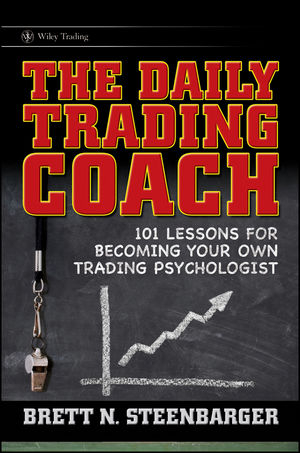
The Daily Trading Coach
John Wiley & Sons Inc (Verlag)
978-0-470-39856-2 (ISBN)
Praise for THE DAILY TRADING COACH
"A great book! Simply written, motivational with unique content that leads any trader, novice or experienced, along the path of self-coaching. This is by far Dr. Steenbarger's best book and a must-have addition to any trader's bookshelf. I'll certainly be recommending it to all my friends."
Ray Barros CEO, Ray Barros Trading Group
"Dr. Steenbarger has been helping traders help themselves for many years. Simply put, this book is a must-read for anyone who desires to achieve great success in the market."
Charles E. Kirk The Kirk Report
"'Dr. Brett', as he is affectionately known by his blog readers, has assembled a practical guide to self coaching in this excellent book. The strategies he outlines are further enhanced with numerous resources and exercises for the reader to refer to and keep the principles fresh. I enthusiastically encourage anyone interested in bettering their trading and investing to read this book and keep it on their desk as a constant source of learning."
Brian Shannon, www.alphatrends.net author of Technical Analysis Using Multiple Timeframes
"Dr. Brett has distilled his years of experience, as both a trader and a psychologist/coach, into the 101 practical lessons found in The Daily Trading Coach. Those lessons provide effective strategies for coping with the stumbling blocks that traders often face. This book should be a cornerstone of any serious trader's library."
Michael Seneadza equities trader and blogger at TraderMike.net
BRETT N. STEENBARGER, PHD, is Associate Professor of Psychiatry and Behavioral Sciences at SUNY Upstate Medical University in Syracuse, New York. An active trader and author of the popular TraderFeed blog, Steenbarger coaches traders in hedge funds, proprietary trading groups, and investment bank settings. He is also the author of the Wiley titles Enhancing Trader Performance and The Psychology of Trading. Steenbarger received a BS from Duke University and a PhD in clinical psychology from the University of Kansas.
Preface xiii
Acknowledgments xvii
Introduction 1
Chapter 1 Change: The Process and the Practice 3
Lesson 1: Draw on Emotion to Become a Change Agent 4
Lesson 2: Psychological Visibility and Your Relationship with Your Trading Coach 7
Lesson 3: Make Friends with Your Weakness 9
Lesson 4: Change Your Environment, Change Yourself 11
Lesson 5: Transform Emotion by Trace-Formation 14
Lesson 6: Find the Right Mirrors 17
Lesson 7: Change Our Focus 20
Lesson 8: Create Scripts for Life Change 23
Lesson 9: How to Build Your Self-Confidence 25
Lesson 10: Five Best Practices for Effecting and Sustaining Change 29
Resources 32
Chapter 2 Stress and Distress: Creative Coping for Traders 33
Lesson 11: Understanding Stress 33
Lesson 12: Antidotes for Toxic Trading Assumptions 37
Lesson 13: What Causes the Distress That Interferes with Trading Decisions? 40
Lesson 14: Keep a Psychological Journal 43
Lesson 15: Pressing: When You Try Too Hard to Make Money 45
Lesson 16: When You’re Ready to Hang It Up 48
Lesson 17: What to Do When Fear Takes Over 51
Lesson 18: Performance Anxiety: The Most Common Trading Problem 54
Lesson 19: Square Pegs and Round Holes 58
Lesson 20: Volatility of Markets and Volatility of Mood 61
Resources 64
Chapter 3 Psychological Well-Being: Enhancing Trading Experience 67
Lesson 21: The Importance of Feeling Good 67
Lesson 22: Build Your Happiness 71
Lesson 23: Get into the Zone 73
Lesson 24: Trade with Energy 77
Lesson 25: Intention and Greatness: Exercise the Brain through Play 79
Lesson 26: Cultivate the Quiet Mind 83
Lesson 27: Build Emotional Resilience 86
Lesson 28: Integrity and Doing the Right Thing 89
Lesson 29: Maximize Confidence and Stay with Your Trades 91
Lesson 30: Coping—Turn Stress into Well-Being 95
Resources 97
Chapter 4 Steps toward Self-Improvement: The Coaching Process 99
Lesson 31: Self-Monitor by Keeping a Trading Journal 99
Lesson 32: Recognize Your Patterns 103
Lesson 33: Establish Costs and Benefits to Patterns 106
Lesson 34: Set Effective Goals 109
Lesson 35: Build on Your Best: Maintain a Solution Focus 111
Lesson 36: Disrupt Old Problem Patterns 114
Lesson 37: Build Your Consistency by Becoming Rule-Governed 118
Lesson 38: Relapse and Repetition 121
Lesson 39: Create a Safe Environment for Change 123
Lesson 40: Use Imagery to Advance the Change Process 126
Resources 130
Chapter 5 Breaking Old Patterns: Psychodynamic Frameworks for Self-Coaching 131
Lesson 41: Psychodynamics: Escape the Gravity of Past Relationships 132
Lesson 42: Crystallize Our Repetitive Patterns 135
Lesson 43: Challenge Our Defenses 138
Lesson 44: Once Again, with Feeling: Get Distance from Your Problem Patterns 141
Lesson 45: Make the Most Out of Your Coaching Relationship 144
Lesson 46: Find Positive Trading Relationships 147
Lesson 47: Tolerate Discomfort 150
Lesson 48: Master Transference 153
Lesson 49: The Power of Discrepancy 156
Lesson 50: Working Through 158
Resources 161
Chapter 6 Remapping the Mind: Cognitive Approaches to Self-Coaching 163
Lesson 51: Schemas of the Mind 164
Lesson 52: Use Feeling to Understand Your Thinking 167
Lesson 53: Learn from Your Worst Trades 170
Lesson 54: Use a Journal to Restructure Our Thinking 172
Lesson 55: Disrupt Negative Thought Patterns 176
Lesson 56: Reframe Negative Thought Patterns 179
Lesson 57: Use Intensive Guided Imagery to Change Thought Patterns 182
Lesson 58: Challenge Negative Thought Patterns with the Cognitive Journal 185
Lesson 59: Conduct Cognitive Experiments to Create Change 188
Lesson 60: Build Positive Thinking 190
Resources 193
Chapter 7 Learning New Action Patterns: Behavioral Approaches to Self-Coaching 195
Lesson 61: Understand Your Contingencies 196
Lesson 62: Identify Subtle Contingencies 199
Lesson 63: Harness the Power of Social Learning 201
Lesson 64: Shape Your Trading Behaviors 204
Lesson 65: The Conditioning of Markets 207
Lesson 66: The Power of Incompatibility 211
Lesson 67: Build on Positive Associations 214
Lesson 68: Exposure: A Powerful and Flexible Behavioral Method 217
Lesson 69: Extend Exposure Work to Build Skills 220
Lesson 70: A Behavioral Framework for Dealing with Worry 223
Resources 226
Chapter 8 Coaching Your Trading Business 227
Lesson 71: The Importance of Startup Capital 227
Lesson 72: Plan Your Trading Business 231
Lesson 73: Diversify Your Trading Business 233
Lesson 74: Track Your Trading Results 236
Lesson 75: Advanced Scorekeeping for Your Trading Business 240
Lesson 76: Track the Correlations of Your Returns 244
Lesson 77: Calibrate Your Risk and Reward 248
Lesson 78: The Importance of Execution in Trading 250
Lesson 79: Think in Themes—Generating Good Trading Ideas 254
Lesson 80: Manage the Trade 257
Resources 259
Chapter 9 Lessons from Trading Professionals: Resources and Perspectives on Self-Coaching 261
Lesson 81: Leverage Core Competencies and Cultivate Creativity 261
Lesson 82: I Alone Am Responsible 264
Lesson 83: Cultivate Self-Awareness 271
Lesson 84: Mentor Yourself for Success 275
Lesson 85: Keep Detailed Records 279
Lesson 86: Learn to Be Fallible 283
Lesson 87: The Power of Research 286
Lesson 88: Attitudes and Goals, the Building Blocks of Success 290
Lesson 89: A View from the Trading Firms 295
Lesson 90: Use Data to Improve Trading Performance 300
Resources 305
Chapter 10 Looking for the Edge: Finding Historical Patterns in Markets 307
Lesson 91: Use Historical Patterns in Trading 308
Lesson 92: Frame Good Hypotheses with the Right Data 310
Lesson 93: Excel Basics 313
Lesson 94: Visualize Your Data 317
Lesson 95: Create Your Independent and Dependent Variables 320
Lesson 96: Conduct Your Historical Investigations 324
Lesson 97: Code the Data 327
Lesson 98: Examine Context 329
Lesson 99: Filter Data 332
Lesson 100: Make Use of Your Findings 334
Resources 336
Conclusion 339
Lesson 101: Find Your Path 339
For More on Self-Coaching 341
About the Author 343
Index 345
| Erscheint lt. Verlag | 3.4.2009 |
|---|---|
| Reihe/Serie | Wiley Trading |
| Zusatzinfo | Drawings: 2 B&W, 0 Color; Tables: 1 B&W, 0 Color |
| Verlagsort | New York |
| Sprache | englisch |
| Maße | 160 x 302 mm |
| Gewicht | 567 g |
| Themenwelt | Geisteswissenschaften ► Psychologie ► Arbeits- und Organisationspsychologie |
| Wirtschaft ► Betriebswirtschaft / Management ► Finanzierung | |
| ISBN-10 | 0-470-39856-6 / 0470398566 |
| ISBN-13 | 978-0-470-39856-2 / 9780470398562 |
| Zustand | Neuware |
| Informationen gemäß Produktsicherheitsverordnung (GPSR) | |
| Haben Sie eine Frage zum Produkt? |
aus dem Bereich


